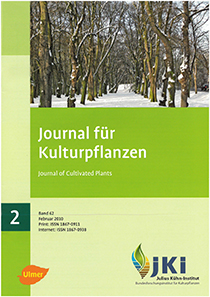Monitoring of total contents of copper in organically and conventionally managed soils. Part 1: Study plan and preliminary sampling of copper and other anthropogenic induced heavy metal contents in vineyard soils
DOI:
https://doi.org/10.5073/JfK.2010.02.03Keywords:
Copper, control of fungi, Peronospora, Plasmopora, vineyard soils, load situation in viticulture, risk potential, exposure assessment, preselection of adequate monitoring areas, regulationAbstract
The project aims to develop a survey designed for the representative assessment of copper contents in vineyard soils. The method development for the sampling of adequate monitoring areas is based on a preliminary survey of load distribution as well as on exposure assessment on selected areas of some typical vinery sites in Rheinland-Pfalz, differently managed and with different use history. Additionally to the sampling of selected areas, which reflects the spectrum of the load situation in viticulture, chemical quantitative analysis of soil samples collected from areas of known mode of cultivation and history followed by biological standard tests will be conducted. Obtained findings will serve for further method development, for preselection of adequate monitoring areas and for first indications of hazard potential. The project is a prerequisite for the performance of the long-term study “Development of current data of effects of copper contents in organic soils in viticulture, pomiculture and hopculture on soil life in terms of the strategy paper concerning further copper application in agriculture, especially in organic farming.”
Published
Issue
Section
License
The content of the journal is licensed under the Creative Commons Attribution 4.0 License. Any user is free to share and adapt (remix, transform, build upon) the content as long as the original publication is attributed (authors, title, year, journal, issue, pages).
The copyright of the published work remains with the authors. The authors grant the Journal of Cultivated Plants, the Julius Kühn-Institut and the OpenAgrar repository the non-exclusive right to distribute and exploit the work.







